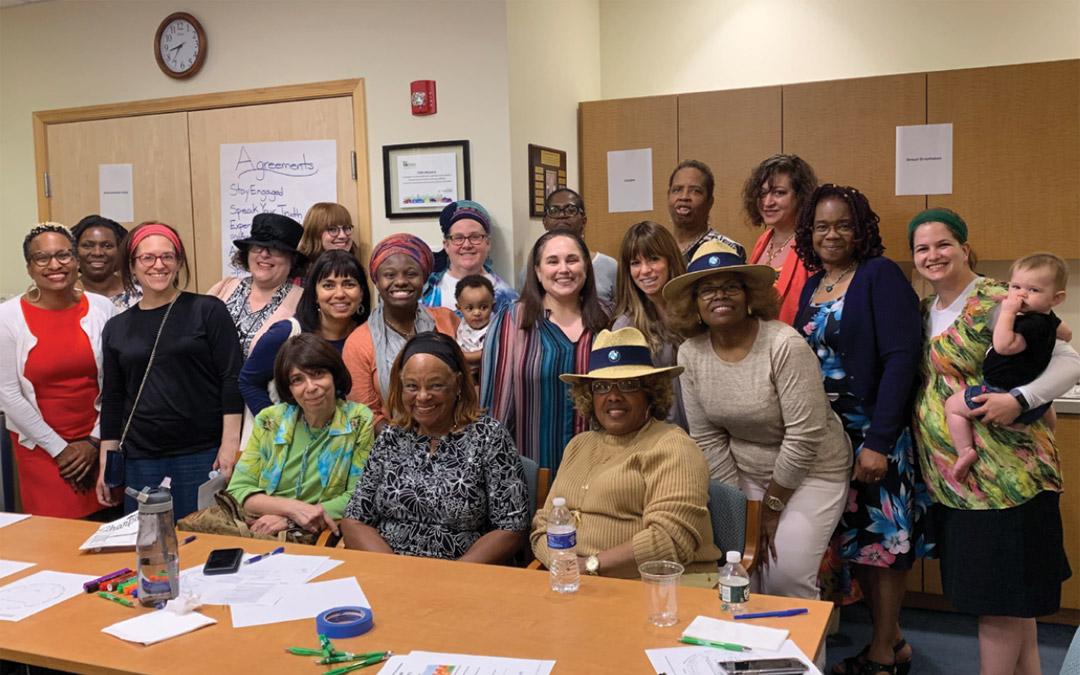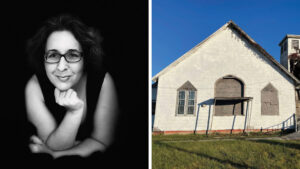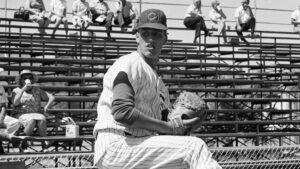Over the past year, the program known as Community Conversations: Creating a Diverse Mosaic has been facilitated by CHAI, or Comprehensive Housing Assistance Inc., an agency of The Associated: Jewish Federation of Baltimore.
The cohort provides a forum for 19 African-American and Orthodox women living in Northwest Baltimore to break down barriers and talk about such issues as historic injustices, systemic racism, gender bias, interfaith relations, community violence, and religious and cultural identities.
On Sunday, Aug. 9, members of Community Conversations planned to participate in the Park Heights Women’s Solidarity March. But this week, organizers said the the march was cancelled due to concerns about COVID-19 and social distancing.
Jmore recently asked Dee Evans and Rina Goloskov, a pair of Community Conversations participants – one African-American, the other Orthodox — to write about their participation in the cohort and the bonds forged between members, who live in the Cheswolde, Cross Country, Fallstaff, Glen and Mount Washington neighborhoods.
Filling a Hole in the Soul
My family has lived in the Glen community for more than 40 years. I’ve always wanted my family and me to know more about our Jewish neighbors.
When I used to walk my children to school, we all passed each other but there was no real communication. We existed around each other’s lives, but no legitimate connections existed.
That is, until the wintertime when everyone would come together to clear our streets in order to get out to Park Heights Avenue.
But when that was over, we all retreated back to our separate lives.
In the late 1990s, I became a member of the Glen Neighborhood Improvement Association. Being a member of the association allowed me to become involved in the community. Our monthly meetings incorporate all of the community members’ cultures of the people who live together in Glen.
I was honored when I was recognized as a leader with the community association and asked to join CHAI’s inaugural Community Conversations cohort last year. It was the first time I had an opportunity to sit down with women of different ethnic backgrounds and learn how much we are alike!
I found out that more than anything else, we are WOMEN!
We are women who love our families, women from different educational levels, women who respect and hold reverence to our chosen faiths. Women who share some of the same fears and are very concerned about where our country is headed in the future, and women whose bodies are changing every year — some for the good and some not so good!
I found out so many things that helped me feel closer to our neighborhood. When I see the ladies at community events now, I feel that important connection that comes with being a part of our community for real.
Being a part of Community Conversations filled a big hole that I used to have in my soul. I’m very grateful for that, and I look forward to seeing and connecting with the women in our group more in the future.
–Dee Evans
No Liberation Without The Other
In his book “Not in My Neighborhood: How Bigotry Shaped a Great American City” (Ivan R. Dee Publishing), Antero Pietila recounts the discriminatory residential real estate practices that both African-Americans and Jews faced in Baltimore City dating back to the 1880s up through the subprime mortgage crisis of 2008.
Pietila traces the succession of neighborhoods from non-Jewish to Jewish, from Jewish to African-American, and the resultant tensions between Baltimore’s Black and Jewish communities.
Those tensions still linger. Expressions of resentment and misunderstanding from one community to the other are readily seen online and overheard in daily conversations.
I reached out to Tikvah Womack, a Jewish woman of color, who was leading a workshop about Jews of color at her shul. We considered how to address these conflicts by building relationships between the two communities.
We approached CHAI to form the Community Conversations program, bringing together Black and Jewish women to learn about each other’s communities and lived experiences. Thanks go to Sherrell Savage, CHAI’s Northwest community and schools director, and Sharlimar Douglass, who created and facilitated the program, encouraging all participants to truly understand how our identities impacted our daily experiences.
Tikvah describes her experience in the cohort: “Being involved in the building of the cohort made sense to me as I have every day lived experiences in both worlds — a lens to offer each community to understand the other, and a deeply felt compassion for both communities’ histories.
“The experience solidified my unapologetic expression of both of my identities as a Black woman and Jewish woman in the Baltimore community. It helped me realize there is not only a need but also a desire to bridge the two communities and learn from one another.”
COVID-19 illuminated the long-standing disparity in health care access for African-Americans. Seeing the nation’s collective suffering from the pandemic, but at a larger scale in the Black community, was disheartening and traumatizing.
The recent deaths of George Floyd, Breonna Taylor and Ahmud Arbery — and reminders of the other Black lives lost due to violence — compounded this grief and opened a flood of emotions that was almost paralyzing. Being in a community with Orthodox white Jewish women who were outside of the black community, but witnessing them struggle, being impacted and sharing in the collective grief, gave me a sense of hope.
Recently, Tova Jussim, a member of the Community Conversations cohort, reached out to me, wanting to respond to these devastating but not uncommon deaths. We were able to transform our paralyzing grief and mobilize to begin a movement by recognizing that we created this platform built on the relationship between our two communities.
We are now partnering in a grassroots effort with Sherrell and Sharlimar to say there is no liberation for one without the other, and in this moment the Black community is calling the world for protection of Black lives.
We designed a Park Heights Women’s Solidarity March where women from the Park Heights community will stand in solidarity to combat anti-Blackness and anti-Semitism in our community. We know firsthand the strength of the women and our collective power. We are pulling on that today with anyone who is connected to a woman to join us in this moment, in this movement.
–Rina Goloskov
For information about Community Conversations, visit https://chaibaltimore.org/news/chais-community-conversations-continues-virtually/.





